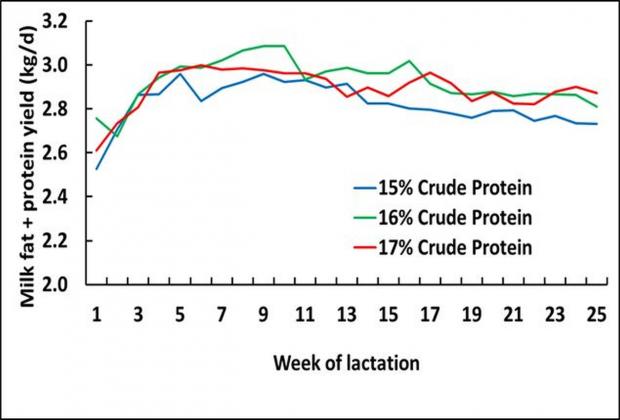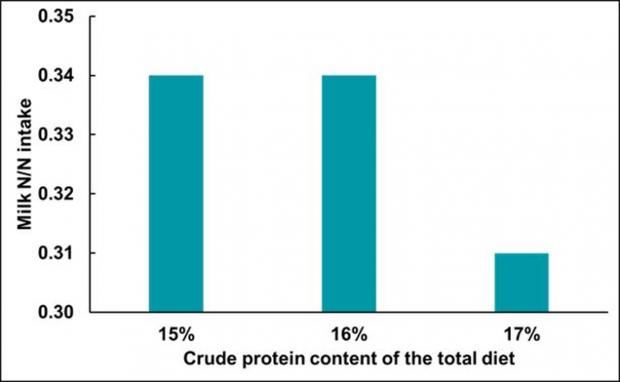Two of Northern Ireland’s leading animal nutrition companies, John Thompsons and Sons Ltd and Trouw Nutrition Ltd, are partnering with the dairy research team at AFBI to develop strategies to reduce nitrogen losses from dairy systems.

Background
Nitrogen, which is derived from the diet (mostly from protein), is an essential nutrient for dairy cows. However, dairy cows do not use nitrogen efficiently, and only approximately 30% of nitrogen consumed is converted into milk protein. Much of the remaining nitrogen is excreted by the cow in manure, and some of this manure nitrogen can be lost to the environment (as nitrates to waterways/ground water sources, and as ammonia and nitrous oxide to the atmosphere).
The efficiency with which nitrogen is utilised can be improved by a number of methods, including reducing the protein content of the cow’s diets. However, as protein is an important driver of milk production, there is concern that reducing protein levels in the diet could reduce performance. To address this issue, AFBI are undertaking a number of studies to improve our understanding of precision formulated lower protein diets on dairy cow performance. This project is being co-funded by DAERA, John Thompsons and Sons Ltd and Trouw Nutrition Ltd.
Overview of first study
The first study within this project involved 90 dairy cows and was conducted over the first 180 days of lactation. While these cows were offered diets which contained either 15, 16 or 17% crude protein, more importantly, all three diets were designed to meet the metabolisable protein requirements of the cows. This is because cows do not have a requirement for crude protein, but instead have a requirement for metabolisable protein. Metabolisable protein refers to the amount of protein (from either microbial protein or rumen undegraded protein) that is absorbed from the small intestine, to provide the amino acids that are necessary for milk production, maintenance, growth and pregnancy.
Within the current study all diets were based on a mixture of grass silage and concentrates (approximately 50 : 50 DM ratio), plus approximately 0.3 kg straw per cow per day. The same grass silage was offered with all diets, and this silage had a dry matter of 35%, a crude protein of 13.5%, and a metabolisable energy content of 11.6 MJ/kg DM. However, the concentrates offered with each treatment were formulated using different raw material inclusion levels to allow the different diet protein levels to be achieved.
Outcomes
Total diet crude protein level had no effect on dry matter intakes, milk yield, milk fat and protein content and milk fat plus protein yield (Table 1).
| Total diet crude protein level (% DM) |
|||
| 15% | 16% | 17% | |
| Total dry matter intake (kg/day) | 23.2 | 23.3 | 23.8 |
| Milk yield (kg/day) | 35.7 | 37.1 | 36.3 |
| Milk fat (%) | 4.49 | 4.46 | 4.47 |
| Milk protein (%) | 3.44 | 3.48 | 3.49 |
| Fat plus protein yield (kg/day) | 2.82 | 2.92 | 2.89 |
| Milk urea nitrogen (mg/kg) | 97 | 115 | 134 |
| Body weight (kg) | 632 | 636 | 651 |
| Body condition score | 2.4 | 2.4 | 2.5 |
However, Figure 1 suggests that for cows on the 15% crude protein treatment, the yield of fat plus protein began to lag behind the yields with the other two treatments towards the end of the study period.


Implications
The results of this study have a number of practical implications. Reducing total diet crude protein improved nitrogen use efficiency, and this will have reduced nitrogen loss to the environment. While reducing total diet crude protein to 15% had no statistical effect on milk and solids production, there was some evidence that this treatment may have been borderline in terms of supplying the requirements of the cows (as evidenced by the drop in fat plus protein yield towards the end of the study).
In conclusion, diets with crude protein levels of between 15 and 16% are likely to be adequate for dairy cows in early lactation, provided the rations are carefully designed and meet the metabolisable protein requirements of the cows. The impact of offering these lower protein diets on ammonia emissions is currently being assessed within the project.
Notes to editors:
AFBI is an arms-length body of DAERA delivering research and development, diagnostic and analytical testing, emergency response capability and expert scientific advice for DAERA and other government departments, public bodies and commercial companies in Northern Ireland, and further afield.
AFBI’s Vision is “Advancing the Local and Global Agri-Food Sectors Through Scientific Excellence”.
AFBI’s core areas:
- Leading improvements in the agri-food industry;
- Protecting animal, plant and human health;
- Enhancing the natural and marine environment.
Latest news
- AFBI issues Nematodirus warning – Spring 2025 11 April 2025
- Managing Nature Based Risks to the UK Economy and Opportunities for Green Finance 08 April 2025
- AFBI Hillsborough host AERA committee 27 March 2025
- The Omics Days Conference 27 March 2025
